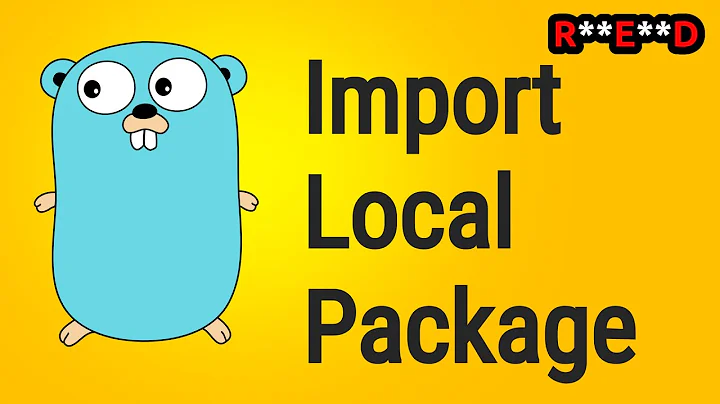Go modules, private repos and gopath
Solution 1
I use a workaround with GITHUB_TOKEN to solve this.
- Generate
GITHUB_TOKENhere https://github.com/settings/tokens export GITHUB_TOKEN=xxxgit config --global url."https://${GITHUB_TOKEN}:[email protected]/mycompany".insteadOf "https://github.com/mycompany"
Solution 2
I use ls-remote git command to help resolve private repo tags and go get after it.
$ go env GO111MODULE=on
$ go env GOPRIVATE=yourprivaterepo.com
$ git ls-remote -q https://yourprivaterepo.com/yourproject.git
$ go get
Solution 3
I wrote up a solution for this on Medium: Go Modules with Private Git Repositories.
The way we handle it is basically the same as the answer above from Alex Pliutau, and the blog goes into some more detail with examples for how to set up your git config with tokens from GitHub/GitLab/BitBucket.
The relevant bit for GitLab:
git config --global \
url."https://oauth2:${personal_access_token}@privategitlab.com".insteadOf \
"https://privategitlab.com"
#or
git config --global \
url."https://${user}:${personal_access_token}@privategitlab.com".insteadOf \
"https://privategitlab.com"
I hope it's helpful.
Related videos on Youtube
diagprov
Updated on July 09, 2022Comments
-
 diagprov almost 2 years
diagprov almost 2 yearsWe are converting our internal codebase from the
depdependency manager to go modules (vgoor built in with go1.11.2). Imagine we have code like this:$GOPATH/src/mycompany/myprogram/main.go:
package main import ( "fmt" lib "mycompany/mylib" ) func main() { fmt.Println("2+3=", lib.add(2, 3)) }$GOPATH/src/mycompany/myprogram/go.mod:
module mycompany/myprogram(it doesn't have any dependencies; our real-world code does).
$GOPATH/src/mycompany/mylib/lib.go:
package mylib func Add(x int, y int) int { return x + y }I didn't module-ize this code; it doesn't seem to matter whether I do or don't.
These are trivial examples but our internal code follows a similar structure as this worked historically.
Since these directories are on the Gopath,
export GO111MODULE=autostill builds as before and this works fine (modules not used because we are on the gopath). However, when I setexport GO111MODULE=onI immediately get the error:build mycompany/myprogram: cannot find module for path mycompany/mylibSo I did some research and I would like to validate my understanding. First let me say our old approach worked, but I am more interested in changing to use go modules as it appears to be where the go project itself is headed. So.
-
It seems the intention of the golang authors was that "dotless" paths belong to the standard repository only; that is there should be a binding between domain name and project. We don't use go get on our internal project, unsurprisingly. Here is the source specifically:
Dotless paths in general are reserved for the standard library; go get has (to my knowledge) never worked with them, but go get is also the main entry point for working with versioned modules.
Can anyone with more knowledge of golang than me confirm this?
My key assumption is that once go decides to use modules, all dependencies must be modules and the gopath becomes somewhat irrelevant, except as a cache (for downloaded modules). Is this correct?
-
If this is true, we need to use a private gitlab (in our case) repository on the path. There's an open issue on handling this that I'm aware of so we can implement this if necessary. I'm more interested in the consequences, specifically for iterating in the private repositories. Previously we could develop these libraries locally before committing any changes; now it seems we have a choice:
- Accept this remote dependency and iterate. I was hoping to avoid needing to push and pull remotely like this. There are workarounds to needing an internet connection if strictly necessary.
- Merge everything into one big git repository.
If it matters, I'm using
go version go1.11.2 linux/amd64and my colleagues are usingdarwin/amd64. If it helps, my golang is exactly as installed by Fedora's repositories.So,
tl;dr, my question is: are go modules all-or-nothing, in that any dependency must be resolved using the module system (go get, it seems) and the gopath has become redundant? Or is there something about my setup that might trigger this to fail? Is there some way to indicate a dependency should be resolved explicitly from the gopath?Updates since asking the question:
- I can move
myprogramout of the gopath. The same issue occurs (mylibhas been left in the gopath). - I can run, or not run,
go mod init mycompany/mylibin the mylib directory; it makes no difference at all. - I came across Russ Cox's blog post on vgo. My concerns about offline development that I tried not to dive into too far are resolved by
$GOPROXY.
-
Peter over 5 yearsIt look like you never ran
go mod init mycompanyin $GOPATH/src/mycompany, therefore there is no module yet. // The comment about dotless paths you quoted is by bcmills, one of the Go maintainers (or author, even?). You can take that as authorative. // Modules are not "all-or-nothing". You can depend on non-modules just fine. -
 diagprov over 5 years@Peter I left that out of my question, but I did (otherwise it wouldn't build as a module, no?). I'll edit that into the question. So if this is true my question becomes: if I can depend on non-modules, why doesn't it work? :P
diagprov over 5 years@Peter I left that out of my question, but I did (otherwise it wouldn't build as a module, no?). I'll edit that into the question. So if this is true my question becomes: if I can depend on non-modules, why doesn't it work? :P -
Peter over 5 yearsAh, I see now. You have to add a replace statement in mycompany/myprogram to make this work.
-
 diagprov over 5 years@Peter this sounds like exactly what I need. I added
diagprov over 5 years@Peter this sounds like exactly what I need. I addedreplace mycompany/mylib => ../mylib/to my example, didn't work. So, domain name issue. So I renamed allmycompanyreferences tomycompany.com... and now the build (of the example in my Q) hangs until the internet times out and then gives me the usualbuild mycompany.com/myprogram: cannot find module for path mycompany.com/mylib:( -
 diagprov over 5 yearsSo I guess we need to combine the two approaches; build from private but remote repositories with url-like imports and then we can replace locally to speed up dev.
diagprov over 5 yearsSo I guess we need to combine the two approaches; build from private but remote repositories with url-like imports and then we can replace locally to speed up dev. -
Tarun Tyagi over 4 years@diagprov I am in the same boat and get this error. Were you able to find any solution to your problem?
-
 diagprov over 4 years@TarunTyagi not that was satisfying with gitlab. We could only use top level repositories (gitlab.com/org/repo) and not gitlab.com/org/subproj/repo) because of some crazy gitlab feature. We also had to configure ssh instead of https because there's no token support on gitlab. We've since migrated to github, thankfully.
diagprov over 4 years@TarunTyagi not that was satisfying with gitlab. We could only use top level repositories (gitlab.com/org/repo) and not gitlab.com/org/subproj/repo) because of some crazy gitlab feature. We also had to configure ssh instead of https because there's no token support on gitlab. We've since migrated to github, thankfully. -
 diagprov over 4 yearsGo vanity urls is something I am also investigating right now as a way to provide the required redirection. It still requires the remote end to support the go modules protocol to discover the correct repo format, and some kind of token support for http auth, but it can at least allow you to redirect go.yourcompany.com/repo -> gitlab.com/org/subproj/repo.git (.git required because gitlab doesn't provide support in subprojects for go modules).
diagprov over 4 yearsGo vanity urls is something I am also investigating right now as a way to provide the required redirection. It still requires the remote end to support the go modules protocol to discover the correct repo format, and some kind of token support for http auth, but it can at least allow you to redirect go.yourcompany.com/repo -> gitlab.com/org/subproj/repo.git (.git required because gitlab doesn't provide support in subprojects for go modules).
-
-
 diagprov over 5 yearsThanks. We use gitlab, but a similar workaround exists for this as well and we'll be using it for sure.
diagprov over 5 yearsThanks. We use gitlab, but a similar workaround exists for this as well and we'll be using it for sure. -
TPPZ almost 5 yearsIs there a way to use
httpinstead ofhttps. We have a legacygitserver behind a firewall where everything ishttpand the change above does not work when invoking thegocommand (which is trying to fetch the repo viahttpson port 443) -
 Paweł Szczur almost 5 yearsThis is a common solution, but it fails with
Paweł Szczur almost 5 yearsThis is a common solution, but it fails withhttps://repos.example.com/my-library?go-get=1request made by go tool before reaching cloning phase. -
lmika about 4 yearsYou can use
go env -w GOPRIVATEfor private Github repositories as well:go env -w GOPRIVATE=github.com/username/* -
n1nsa1d00 almost 4 yearsThis is no longer sufficient, you need to also populate
GOPRIVATEnow. -
n1nsa1d00 almost 4 yearsWhat to do if your are working with a private BitBucket repository?
-
n1nsa1d00 almost 4 yearsYou should be more specific and state that your answer, where it mentions BitBucket, is purposely for BitBucket server not BitBucket cloud. Luckily you mention the
.netrcsolution in your article and this happens to work in go @1.13 onwards by also specifying theGOPRIVATE](golang.org/doc/go1.13#modules) environment variable. -
4t8dds about 3 yearsI did not set GOPRIVATE and this heps me.
-
 Lonely about 2 yearsif nothing helps: stackoverflow.com/a/71617473/3025289
Lonely about 2 yearsif nothing helps: stackoverflow.com/a/71617473/3025289








